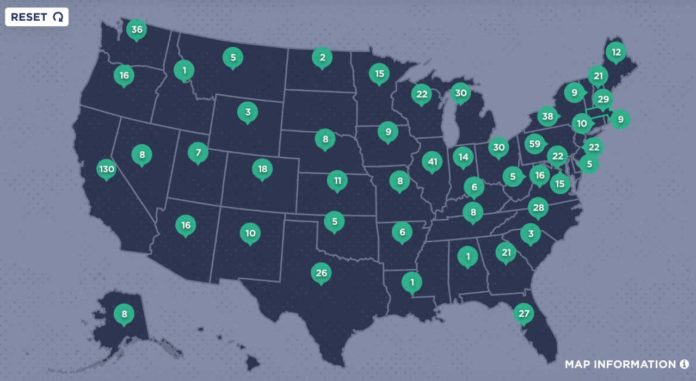More than 880 LGBTQ people across the country are running for elected office this year, according to a report released last week by the Victory Institute. They hope to join the 843 LGBTQ elected officials — a group which has doubled in size since 2016 — who currently serve in local, state, and federal governments.
But according to the Out For America report, despite the record number of out elected officials and candidates for office, the community still has a long road ahead to achieving full representation. LGBTQ people make up approximately 4.5% of the national population, but they make up only 0.17% of elected office holders. Voters would need to elect over 22,500 more LGBTQ people for the community to have an equitable share of the 510-thousand positions.
The report also revealed demographic trends among LGBTQ elected officials across the country. While the majority are white cisgender men, it is notable that people of color, bisexual and transgender elected officials have increased at a faster rate than white cisgender elected officials over the past three years.
In 2020, those numbers are likely to grow even further, at least in the nation’s capital. Two Congressional candidates in New York, Mondaire Jones and Ritchie Torres, have good chances to win seats in November. If elected, the pair would be the first Black gay men elected to the House of Representatives. Other LGBTQ people of color with solid chances to win House seats are Gina Ortiz Jones in Texas and Georgette Gomez in California.
At the state level, the number of LGBTQ elected officials varies wildly, with the greatest concentration in New England and Washington state. New Hampshire has 12 openly LGBTQ lawmakers, while Vermont and Washington are tied with nine each. Pennsylvania has two LGBTQ State Representatives, Rep. Malcolm Kenyatta and Rep. Brian Sims. Eight states, Alaska, Hawaii, Idaho, Kentucky, Louisiana, Mississippi, New Jersey, and Tennessee have no LGBTQ representation at the state level.
LGBTQ people have been elected to public office for almost fifty years. The first LGBTQ person elected to public office was Kathy Kozachenko, who won a seat on the Ann Arbor, Michigan City Council in 1974. She was followed by Elaine Noble in Massachusetts, who was the first LGBTQ person to win election to a state legislature. In 1989, Keith St. John became the first gay Black person elected to public office. Wisconsin’s Tammy Baldwin was the first LGBTQ person to win election to the U.S. House in 1998 and also the first elected LGBTQ U.S. Senator in 2012. And in 2018, Jared Polis in Colorado became the first LGBTQ person to be elected governor.
Since 2017 the Trump administration has sanctioned numerous discriminatory actions against the LGBTQ community, including appointing numerous anti-LGBTQ judges on every level of the judicial system, banning transgender people from serving in the military, supporting religious exemptions to allow employers to fire LGBTQ workers, and trying to eliminate LGBTQ protections in the Affordable Care Act.
In addition, conservative state legislatures currently have over 200 active pieces of anti-LGBTQ legislation, including more than two dozen new anti-LGBTQ bills in January alone.
“The hateful legislation targeting our community in city councils, state legislatures and at the federal level is a byproduct of this gap in representation,” Victory Institute President Annise Parker said in a press release. “Allied elected officials are critically important. But when LGBTQ elected officials are in the halls of power, they change the hearts and minds of their lawmaker colleagues, defeat anti-LGBTQ bills and inspire more inclusive legislation.”
